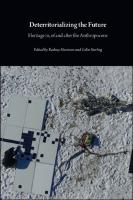Deterritorializing the Future
Heritage in, of and after the Anthropocene
Contributor(s)
Harrison, Rodney (editor)
Sterling, Colin (editor)
Language
EnglishAbstract
Understanding how pasts resource presents is a fundamental first step towards building alternative futures in the Anthropocene. This collection brings together scholars from a range of disciplines to explore concepts of care, vulnerability, time, extinction, loss and inheritance across more-than-human worlds, connecting contemporary developments in the posthumanities with the field of critical heritage studies. Drawing on contributions from archaeology, anthropology, critical heritage studies, gender studies, geography, histories of science, media studies, philosophy, and science and technology studies, the book aims to place concepts of heritage at the centre of discussions of the Anthropocene and its associated climate and extinction crises – not as a nostalgic longing for how things were, but as a means of expanding collective imaginations and thinking critically and speculatively about the future and its alternatives. Contributors: Christina Fredengren, Cecilia Åsberg, Anna Bohlin, Adrian Van Allen, Esther Breithoff, Rodney Harrison, Colin Sterling, Joanna Zylinska, Denis Byrne, J. Kelechi Ugwuanyi, Caitlin DeSilvey, Anatolijs Venovcevs, Anna Storm and Claire Colebrook.
Keywords
anthropocene; deterritorializingISBN
9781785420887Publisher
Open Humanities PressPublication date and place
London, 2020Series
Critical Climate Change,Classification
The environment


 Download
Download